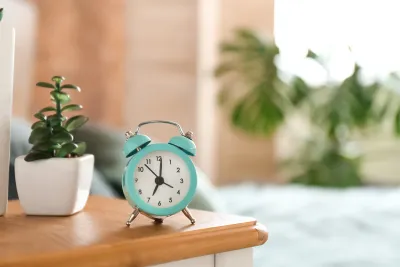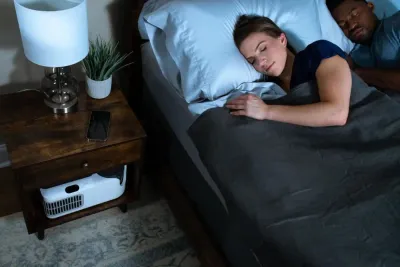
Key Takeaways
- Sleep Reset: Resetting your sleep schedule starts with consistency—wake up and go to bed at the same time every day (yes, even weekends).
- Light Control: Morning sunlight and reduced evening screen time help realign your circadian rhythm naturally.
- Caffeine Cutoff: No late-day jolts—avoid caffeine at least six hours before bedtime to give your brain a break.
- Wind-Down Routine: A relaxing bedtime ritual signals your body it's time to sleep—think reading, light stretching, or meditation.
- Temperature Matters: Your bedroom environment, especially a cool sleep surface like the Chilipad cooling mattress toppers, plays a crucial role in falling and staying asleep.
We’ve all been there—lying in bed, staring at the ceiling at 2 a.m., wondering why our brains won’t just shut down already. Whether it's late-night scrolling, a demanding job, or just life doing its unpredictable thing, a thrown-off sleep schedule is more common than you’d think.
Stay consistent - your body craves consistency, and when that rhythm’s out of whack, everything else—your mood, focus, even your physical health—can feel off too.
Below, we’re breaking down the science behind sleep schedules, why they matter more than you realize, and most importantly—the best ways on how to get yours back on track. If you’re tired of being tired, you’re in the right place.
Understanding Your Sleep Schedule
A consistent routine isn’t just nice to have, it’s a game-changer for your energy, focus, and overall health. But, between late-night emails, everyday stress, and Netflix tempting you past midnight, sticking to a regular sleep schedule can feel impossible.
The good news? Getting back on track can seriously level up your mood, sharpen your thinking, and even boost your health.
Related Blog: 13 Ways to Sleep Better at Night
Reset Your Sleep Schedule with the Chilipad
A great way to fix your sleep schedule is with the help of a bed cooling system, which creates an ideal sleep environment and helps you stay on track for better sleep.
Why Sleep Matters
It’s not just a time for rest; it plays a role in maintaining physical health, emotional well-being, mental health, and cognitive function. According to the Centers for Disease Control and Prevention (CDC), adults should aim for at least seven hours of sleep per night.
Insufficient sleep can lead to a range of health issues, including obesity, diabetes, and cardiovascular disease.
Signs of a Disrupted Sleep Schedule
Noticing the signs is the first step toward turning things around. Here are some common red flags to look out for:
- Difficulty falling asleep or staying asleep
- Waking up feeling unrefreshed
- Increased irritability or mood swings
- Difficulty concentrating during the day
- If you identify with these symptoms, it may be time to take action.
Factors That Can Impact Your Sleep Schedule
Several factors can disrupt your sleep schedule, making it challenging to maintain a consistent routine:
- Jet Lag: Traveling across time zones can disrupt your internal clock, causing difficulty sleeping. Here are some tips on how to fight jet lag.
- Becoming a Parent: New parents often experience irregular sleep patterns, often caused by nighttime feedings and caring for infants.
- Shift Work: Working non-traditional hours, shift workers, can disrupt your natural sleep-wake cycle.
- Stress and Anxiety: High levels of stress and anxiety can make it difficult to relax and fall asleep.
- Health Conditions: Certain medical conditions, such as sleep apnea or chronic pain, can interfere with your quality of sleep.
Related Blog: Learn more about the common sleep disorders that can disrupt your sleep.
Tips to Fix Your Sleep Schedule
If you're tired of tossing and turning or waking up groggy, here are a few practical, science-backed tips to help you get your sleep schedule back on track.
Stick to a Sleep Schedule
One of the most effective ways to reset your sleep schedule is to establish a consistent bedtime and wake-up time each day. To achieve this, it’s best to aim to go to bed and wake up at the same time every day, including weekends.
This helps regulate your body's internal clock, making it easier to sleep and wake up naturally.
For example, if you want to wake up at 7 a.m.? Start aiming for an 11 p.m. bedtime and gradually shift it by 15–30 minutes each night until you reach your target.
Bright Light Exposure
Light plays a significant role in regulating your circadian rhythm. Exposure to natural light in the morning can help signal your body that it's time to wake up. Over time, your internal clock will adjust to this natural cue, making it easier to rise with the sun.
But reducing light exposure in the evening can promote melatonin production, which helps you feel sleepy.
- Morning: Open your curtains or take a morning walk to soak up natural, bright light.
- Evening: Dim the lights and avoid electronic screens at least an hour before bed.
Did You Know: Make it a habit to soak up some sun in the first 30 to 60 minutes after waking up. Studies have confirmed that this can heighten alertness, uplift mood, reduce stress, and enhance sleep quality. [1]

Cool and Comfortable Bedroom Environment
This one is our favorite. Sleep at the right temperature. Your bedroom should be a peaceful oasis that invites relaxation. A dark, quiet environment is ideal for promoting restful sleep.
Keep the temperature cool but comfortable, and consider using soothing scents like lavender, which can help you unwind.
Invest in a comfortable mattress, pillow, and bedding that you love to make your bed even more inviting. Consider adding a bed cooling system like the Chilipad bed cooling systems for ultimate comfort. Whether it's the Chilipad Cube, the original bed cooling pad, or the Chilipad Dock Pro, the advanced bed cooling system.
Both bed cooling systems can regulate your body temperature, keeping you cool and comfortable all night, especially in hot summer. But they can also keep you warm and cozy in the cooler months.
Creating a cozy and welcoming sleeping environment can significantly improve the quality of your sleep.
Limit Naps: Choose Wisely
While napping can be beneficial and provide some benefits, it can also disrupt your nighttime sleep if done incorrectly. If you really need a nap, keep it quick—under 30 minutes—and try to sneak it in early in the afternoon.
This prevents it from disrupting your ability to fall asleep later that night.
- Keep Daytime Naps Short: Take naps lasting no more than 20-30 minutes. If daytime naps exceed this duration, they can result in sleep inertia, causing lingering grogginess upon waking up, which is the worst feeling!
- Nap Early in the Day: It's best to take a nap in the early afternoon, ideally between 12 PM and 3 PM. Taking a nap later in the day can disrupt your sleep.
- Listen to Your Body: When you're really tired, taking a quick, short nap can help. But if you notice that napping makes it tough for you to sleep at night, it might be better to skip it altogether.
Relaxation Techniques Before Bed
Doing something relaxing before bed is a great way to cue your body that it’s time to power down for the night. Consider the following and incorporate the ones you like into your bedtime routine.
- Yoga: Gentle stretching can help relax your muscles.
- Meditation: Mindfulness techniques can reduce stress and promote relaxation.
- Reading: A good book can distract your mind from daily stressors.
- Podcast: Listening to soothing sounds and stories can help prepare your mind for sleep.
Here are some ways that meditation can help improve our sleep:
- Reduces stress and anxiety: Meditation can help reduce stress and anxiety, which are common causes of insomnia and other sleep disorders.
- Regulates the body’s internal clock: Meditation can help regulate our body’s internal clock, which can help improve our sleep-wake cycle.
- Improves sleep quality: Meditation can help improve the quality of our sleep by reducing sleep fragmentation and increasing deep sleep.
Move Your Body, Get Regular Exercise
Engaging in regular physical activity can help you sleep more soundly at night. Shoot for at least 30 minutes of moderate activity—like walking, biking, or dancing—most days of the week. Just try to wrap up intense workouts a few hours before bed so your body has time to wind down.
Fact. When we exercise, we sleep better. [2]
For example, a brisk walk or a light jog in the morning can help set a positive tone for the day and prepare your body for the night.
Additionally, research indicates that staying active on a regular basis contributes to a good sleep routine and assists in regulating your body's internal clock. [3]

Limit Screen Time Before Bed
Screens are everywhere, and we’re glued to them more than ever. But all that late-night scrolling can seriously throw off your body’s natural rhythm. The blue light from cell phones, tablets, TV screens, and laptops interferes with melatonin, the hormone that helps you wind down, making it harder to sleep.
Engaging with screens before bedtime can lead to increased alertness and mental stimulation, making it difficult for your brain to wind down and rest. This can result in a cycle of poor sleep quality and daytime fatigue.
Sleep Tip: Try to avoid bright screens for at least two to three hours before going to bed. [4]
Practical Tips for Healthy Sleep:
- Set a Digital Curfew: Aim to turn off all screens at least one hour before bedtime. This allows your body to transition into a more relaxed state.
- Create a Relaxing Pre-Sleep Routine: Instead of scrolling through social media or binge-watching your favorite show, consider activities that promote relaxation. Reading a book, practicing gentle yoga, or meditating can help signal to your body that it's time to wind down.
- Use Filters: If you have to use screens in the evening, consider using blue light filtering apps or glasses. These can help reduce the impact of the light on your sleep cycle.
Create a Bedtime Routine
A bedtime routine makes a difference when you struggle to get a good night's sleep. Studies show that calming activities can help you fall asleep faster and enjoy a more restful night. [5]
- Read a Book: Dive into a good book to shift your focus away from worries and ignite your imagination. Learn more about the benefits of reading before bed.
- Take a Warm Bath or Shower: The warmth of the water can relax your muscles and calm your mind.
- Practice Relaxation Techniques: To soothe your body and mind, try using methods such as deep breathing, meditation, or progressive muscle relaxation.
- Listen to Soothing Music: Play soft, calming music to create a peaceful atmosphere. Find out more about how music can help you sleep.
- Journaling: Write down your thoughts and feelings to clear your mind and reduce stress.
- Sleep Podcasts: Consider listening to soothing sounds or storytelling podcasts, as they can help you unwind your mind and encourage sleep.
Give it a try and see if any of these calming bedtime routines help you fall asleep. Keep in mind that the right bedtime is different for everyone, as we all have slightly different needs when it comes to getting good sleep.
Create a Sleep-Friendly Bedroom
Your sleep environment can significantly impact your ability to fall asleep and stay asleep. Consider the following tips to create a conducive atmosphere:
- Darkness: Block out light with blackout curtains to help your body wind down naturally.
- Quiet: Use white noise machines or earplugs to cut through background noise and keep things peaceful.
- Comfort: Choose a mattress and pillows that match your preferred sleep position and support your body.
- Temperature: Try a Chilipad cooling mattress topper to personalize your bed’s temperature—whether you run hot, cold, or somewhere in between.

Avoid Late Night Meals
Late-night snacks or big meals can disrupt your sleep. Studies have shown that eating too close to bedtime can interfere with your sleep quality. This is especially true if you're trying to fix your sleep schedule. [6]
Why does this happen? When you eat, your body focuses on digestion, which can keep your mind and body active.
Aim to have your final meal at least three hours before going to bed. If possible, avoid eating large snacks after that time. This will allow your body to digest the food properly before you go to sleep.
Sure, it can be challenging at times, but the more effort you put into it, the more manageable it becomes. If you’re hungry, consider eating a small, light snack, such as yogurt or a banana, before bed
Limit Caffeine Late in the Evening
Caffeine can keep you up at night. It's a stimulant found in coffee, tea, chocolate, soft drinks, and energy drinks. When you drink caffeine, it tricks your brain into thinking you're wide awake. This can make it hard to fall asleep, even if you're really tired.
So, it's best to avoid caffeine in the afternoon and evening because its effects can last for several hours.
For example, if you aim to sleep at 10 p.m., try to have your last caffeinated drink by 4 p.m. Most people are more sensitive to caffeine, so they may need to stop even earlier in the day.
Related Blog: How Does Caffeine Affect Sleep. It is important to understand how consuming coffee and other caffeinated items can affect your ability to fall asleep and the quality of your sleep overall.
When to Speak to Your Doctor?
If you still find it difficult to fix your sleep schedule, you can always talk to your primary care provider about your sleep problems. The role of sleep medicine in diagnosing and treating sleep disorders is crucial for understanding and managing these issues effectively.
If it’s affecting your daily life, don’t hesitate to reach out to your doctor. Sleep is important for our overall health, meantal health, and well-being. If you’re not getting enough quality sleep, it can have a negative impact on your body and mind.
Your doctor plays a crucial role in identifying the underlying causes of your sleep issues. They can recommend appropriate treatments or refer you to a sleep specialist if needed. Rest assured, you’re in good hands.
Final Thought
Remember, adjusting your sleep schedule is a gradual process that requires dedication, consistency, and a commitment to improving your overall well-being.
By becoming familiar with your body's natural rhythms and making thoughtful changes to your daily routines, you can establish a well-balanced sleep pattern that supports your health and happiness. Keep in mind that it's not about being perfect but about making progress.
Even small changes can significantly impact over time, leading to more rejuvenating nights and productive days. So, take that first step today—your future self will be grateful!
Summary FAQs
What Are Common Sleep Schedule Mistakes to Avoid
There are several common sleep schedule mistakes that we should avoid in order to maintain a healthy sleep schedule. Here are some of the most common mistakes:
- Irregular sleep timings: Going to bed and waking up at different times each day can disrupt our body’s internal clock and make it difficult to fall asleep and stay asleep.
- Using electronic devices before bed: The blue light emitted by electronic devices can suppress melatonin production, making it difficult to fall asleep.
- Consuming caffeine and nicotine before bed: Caffeine and nicotine are stimulants that can make it difficult to fall asleep and reduce the quality of our sleep.
- Not creating a relaxing bedtime routine: A relaxing bedtime routine can help signal to our body that it’s time to sleep, making it easier to fall asleep and stay asleep.
By avoiding these common sleep schedule mistakes, we can improve the quality of our sleep and overall health.
What is a Bad Sleep Schedule?
If you think you're not getting enough sleep, consider these signs: taking more than 30 minutes to fall asleep after getting into bed, waking up more than once during the night, and lying awake for over 20 minutes when you wake up in the middle of the night.
Does Pulling an All-Nighter Reset Sleep Schedule?
It might sound like a quick fix, but pulling an all-nighter won’t magically reset your sleep schedule. The idea that staying up all night will reboot your internal clock is a common myth—and one that usually backfires.
Resources
[1] Mead MN. Benefits of sunlight: a bright spot for human health. Environ Health Perspect. 2008 Apr;116(4):A160-7. doi: 10.1289/ehp.116-a160. Erratum in: Environ Health Perspect. 2008 May;116(5):A197. PMID: 18414615; PMCID: PMC2290997.
[2] Johns Hopkins Medicine. (2019). Exercising for Better Sleep. Retrieved from Johns Hopkins Medicine. View Resource
[3] Kline CE. The bidirectional relationship between exercise and sleep: Implications for exercise adherence and sleep improvement. Am J Lifestyle Med. 2014 Nov-Dec;8(6):375-379. doi: 10.1177/1559827614544437. PMID: 25729341; PMCID: PMC4341978.
[4] Harvard Health Publishing. “Blue Light Has a Dark Side.” Harvard Health, Harvard Health, 7 July 2020. View Resource
[5] Institute for Quality and Efficiency in Health Care. “Insomnia: Relaxation Techniques and Sleeping Habits.” Institute for Quality and Efficiency in Health Care (IQWiG), 9 Mar. 2017. View Study
[6] Crispim CA, Zimberg IZ, dos Reis BG, Diniz RM, Tufik S, de Mello MT. Relationship between food intake and sleep pattern in healthy individuals. J Clin Sleep Med. 2011 Dec 15;7(6):659-64. doi: 10.5664/jcsm.1476. PMID: 22171206; PMCID: PMC3227713.









